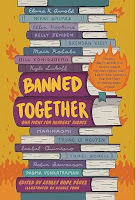It’s not often that one sees a title with starred reviews from Booklist, Kirkus, Publishers Weekly and School Library Journal, but a new book intended for high school students achieved just that. Dedicated to “brave readers everywhere who persist when cowards try to erase stories and communities from libraries,” BANNED TOGETHER is edited by Ashley Hope Pérez and illustrated by Debbie Fong. In order to chronicle “Our Fight for Readers' Rights,” Pérez has compiled contributions (essays, poetry, drawings) from sixteen authors like Ellen Hopkins, Kyle Lukoff, and Nikki Grimes whose work has been challenged or banned. Also included is a short graphic novel type story about The Vandegrift Banned Book Club in Leander, Texas. Booklist says, “this collection movingly reminds readers of the power they have against censorship.” Check out a copy today.
Another tool for restricting information is to limit library funding as evidenced in a recent executive order intent on dismantling "the only federal agency dedicated to sustaining the entire museum and library ecosystem in the United States." Please see the American Libraries Association page of FAQs about the recent executive order impacting IMLS, The Institute of Museum and Library Services. The ALA suggests several actions to take now. More information is available through news stories such as those found at The Conversation, the Associated Press, and NPR or from other advocacy groups like EveryLibrary.









